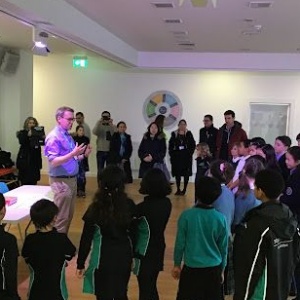
STEM Competition Final – Junior School Fitzwilliam Building and Dame Bradbury’s
Published on 19/04/23

In March, teams from our two Junior Schools, Fitzwilliam Building and Dame Bradbury’s, came together in the Fitzwilliam Hall for the culmination of this year’s STEM Competition: the final judging event, with the teams’ projects being assessed by our guest judge, Dr Hugh Shercliff of Cambridge University’s Engineering Department.
Part of Dr Shercliff’s research interests is how engineering can be used to improve environmental sustainability, which was the overall theme of this year’s competition.
Teams of pupils have been working on their own independent research projects during the course of the spring term, going through all the stages of research: from coming up with a question to investigate, planning how to go about it and collect data, carrying out the practical work and finally preparing presentations to showcase their projects before Dr Shercliff, parents, fellow pupils and staff at the judging event.
The teams chose a wide range of research topics: the optimal design of wind and water turbines, how temperature affects seed growth, how the amount of water affects biodiversity in a model mini-ecosystem or ‘terrarium’ and the amount of smoke produced by burning different fuels.
Judging the best teams was, as always, a tricky task, given the high quality of all the projects and the dedication and resilience shown by all of the teams. The key success criteria were the ability of the team to display creativity, communication and collaboration in their projects. The focus was on the process of research and the children’s ability to use scientific concepts to show that they fully understood what their project was all about and its relevance to sustainability issues.
On this basis, Dr Shercliff decided that the winners were ‘The Windies’, a team of boys from Junior School Dame Bradbury’s who had created a working model wind turbine from a variety of materials available in the lab. They had shown a particularly impressive understanding of the factors involved in their design, such as the angle of the blades on their turbine. The runners-up were ‘The SAMS’, a team of girls from Junior School Fitzwilliam Building, who also made a strong impression with their understanding of the variables they had investigated and how they affect the germination of different kinds of seeds.
The final event was well-attended by parents, staff and pupils, which gave the teams an excellent opportunity to explain what they had been doing, with research materials and apparatus on their tables and some very impressive on-screen presentations.
We are very proud of all the pupils who took part, showing enormous dedication in committing themselves to work together week after week, coping with and overcoming setbacks and seeing their project through to completion. We hope that they will take the experience they have gained with them as they move forward in their educational journey.
Find out more about our Junior School Dame Bradbury’s – Book a Tour
Junior School Fitzwilliam Building Open Day – 23 September – Click here and book your place.







